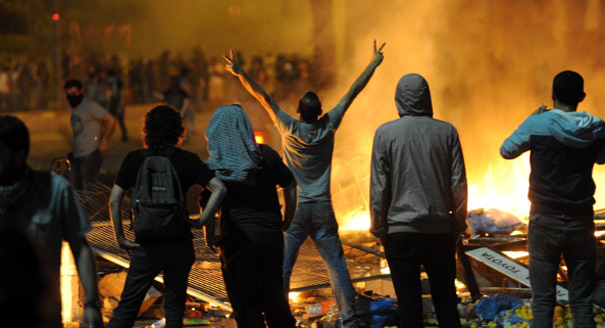Thomas de Waal
{
"authors": [
"Thomas de Waal"
],
"type": "commentary",
"centerAffiliationAll": "",
"centers": [
"Carnegie Endowment for International Peace",
"Carnegie Europe",
"Carnegie Russia Eurasia Center"
],
"collections": [],
"englishNewsletterAll": "",
"nonEnglishNewsletterAll": "",
"primaryCenter": "Carnegie Europe",
"programAffiliation": "",
"programs": [],
"projects": [],
"regions": [],
"topics": []
}
Source: Getty
Arab Spring, Russian Winter, Turkish Summer?
The tumultuous protests in defiance of Turkish prime minister Tayyip Recep Erdogan are inevitably evoking comparisons. A more plausible parallel is of the December 2011 protests in Moscow. However, inevitably the Russian comparison is not a perfect fit either.
Every night this week the center of Turkey’s biggest city has been a carnival of protest. Demonstrators shout the slogan “Zalim, istifa!” or “Tyrant, resign!” and “Istanbul bizim!” or “Istanbul is ours!”
The tumultuous protests in defiance of Turkish prime minister Tayyip Recep Erdogan are inevitably evoking comparisons. Erdogan himself was quick to reject the notion that this is a repeat of the Arab Spring. And indeed, he still commands strong public support in Turkey, two years after winning his third outright election victory in succession.
A more plausible parallel is of the December 2011 protests in Moscow in which educated urban folk found their voice to challenge a leader whom they regarded as arrogant and autocratic, even as much of the country still supported him. And there is something quite Putinesque about Erdogan. He is an extremely skilled politician who dismisses his opponents as marginal and evidently believes that the more power he accumulates the better it will be for Turkey.
Like the Russian leader, Erdogan decided to reset the national clock after (as he saw it) years when Turkey had nothing to be proud of. Increasingly, he has met resistance in this: one recent move that caused unhappiness was the decision to name the new third bridge across the Bosphorus in Istanbul after Sultan Selim “the Grim” who famously murdered thousands of Alevis, the group who currently constitute Turkey’s biggest religious minority.
However, inevitably the Russian comparison is not a perfect fit either. Erdogan is a bold politician who has moved courageously to slay two of Turkey’s biggest dragons, the grip of the military on politics and the Kurdish problem. Unlike Russia, Turkey is still a democracy—with media freedom currently its biggest problem. And unlike Putin, much of the unhappiness against the prime minister is the way he comments on the private sphere, making pronouncements on how he thinks Turks should dress, behave, and (not) drink alcohol.
In the end of course, the current protests will run their own Turkish course. The hope must be that the street violence can be contained and that the confrontation will stay within the bounds of politics. Whatever else, the country is now in the grip of a Turkish Summer and it is likely to be a hot one.
About the Author

Senior Fellow, Carnegie Europe
De Waal is a senior fellow at Carnegie Europe, specializing in Eastern Europe and the Caucasus.
- Europolis, Where Europe EndsCommentary
- Taking the Pulse: Is It Time for Europe to Reengage With Belarus?Commentary
Thomas de Waal, ed.
Recent Work
Carnegie does not take institutional positions on public policy issues; the views represented herein are those of the author(s) and do not necessarily reflect the views of Carnegie, its staff, or its trustees.